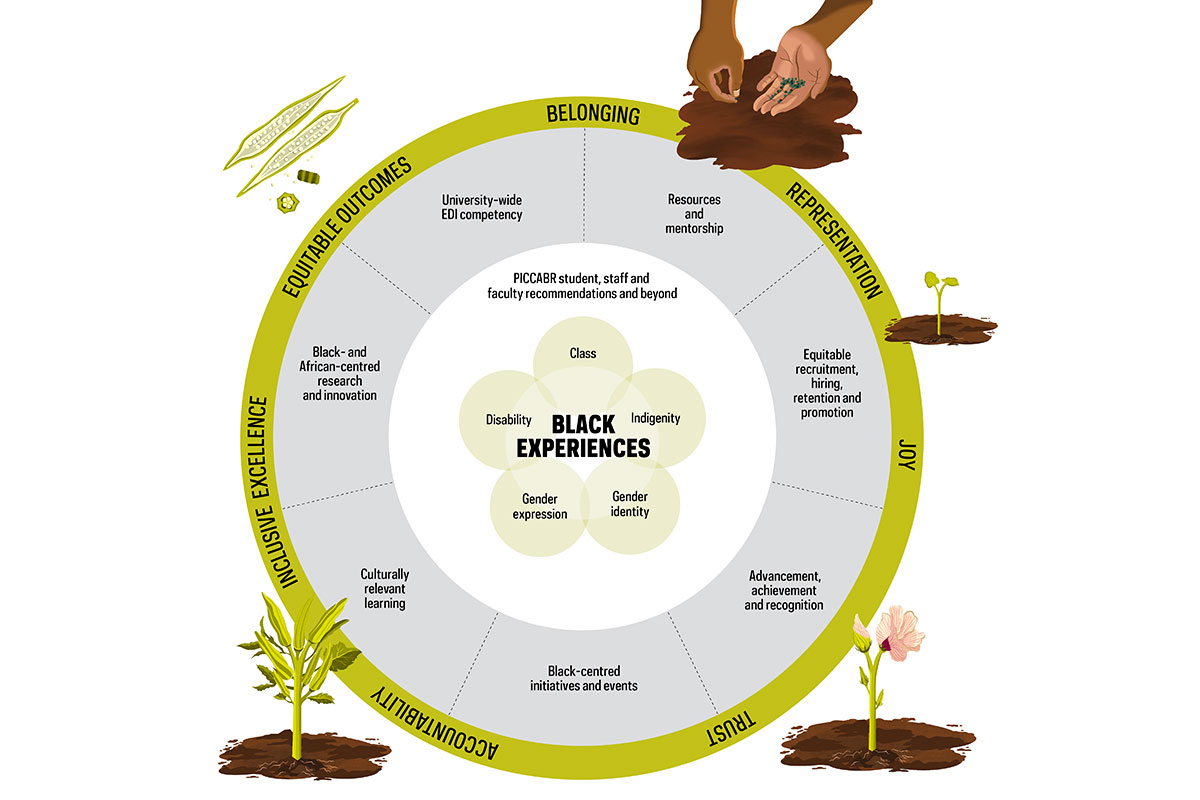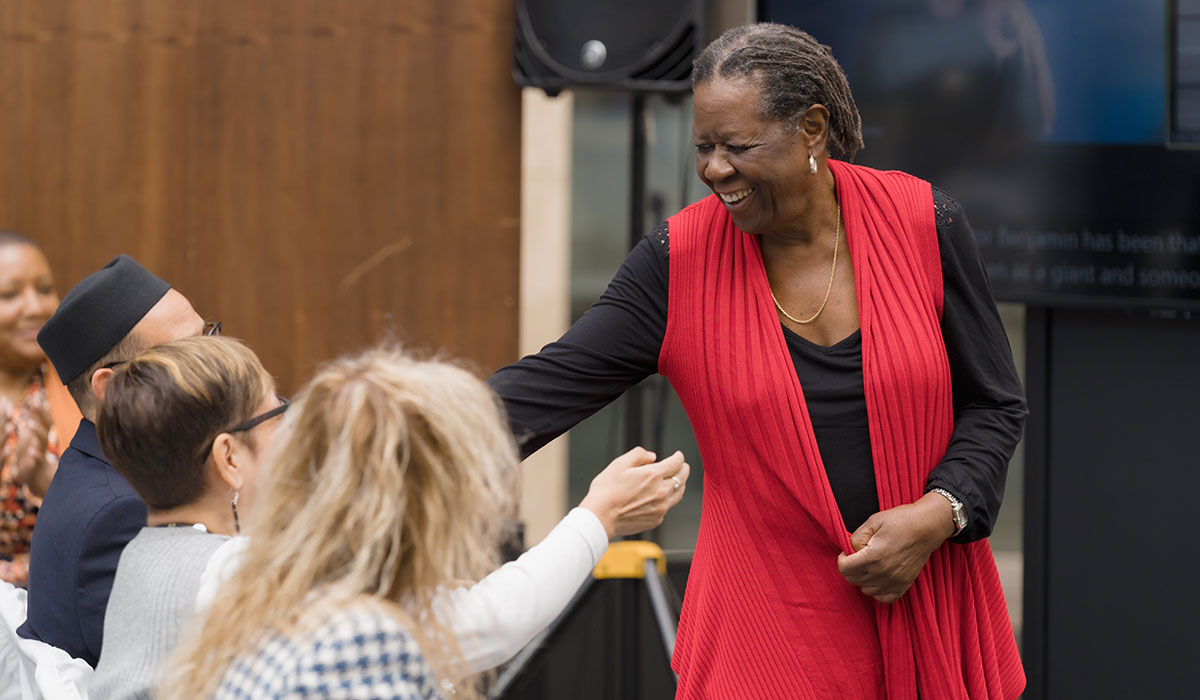Introduction
In July 2020, the Office of the Vice-President, Equity and Community Inclusion (OVPECI) published the university’s (PDF file) Anti-Black Racism Campus Climate Review Report (Climate Review). The report highlighted Black student, staff and faculty experiences of anti-Black racism on campus and put forth a series of 14 recommendations for tangible next steps to create a safer and more intentionally inclusive campus of belonging.
Following the launch of the Climate Review, President Lachemi established the Presidential Implementation Committee to Confront Anti-Black Racism (PICCABR). The PICCABR was composed of nearly 50 dedicated individuals across the university, with leadership from Human Resources, the Office of the Vice-Provost, Students (OVPS), the Office of the Vice-Provost, Faculty Affairs (OVPFA) and the Office of the Vice-President, Administration and Operations (OVPAO). Together, they formed the Student, Staff and Faculty Working Groups, and, with the support of the project team, these working groups were responsible for engaging with the university community to ensure meaningful action on each recommendation.
A Black Student Advisory Committee (BSAC) was created, composed of dedicated students representing various student groups, faculties and departments. In November 2021, the BSAC published the (PDF file) Review of Recommendations Report, which was developed through 12 community consultations and a survey of experiences of anti-Black racism among 378 Black students from the university. The report offered tangible Black student-led insights that ultimately guided approaches to addressing all 14 recommendations.
During the implementation of and discourse about the PICCABR’s work, a new theme emerged: Black flourishing.
Black flourishing offers a multifaceted framework that recognizes the nuances, complexities and intersections of Black experiences. It applies a holistic approach to centring Black well-being, acknowledging factors such as joy, rest, connection and community care. It establishes an environment where Black community members go beyond surviving and instead thrive, grow and unlock their possibilities.

In late 2022, the university cemented its commitment to Black flourishing when President Mohamed Lachemi signed the Scarborough Charter on Anti-Black Racism and Black Inclusion in Canadian Higher Education. The Charter mobilizes Canadian higher education institutions around a commitment to address the realities of anti-Black racism on campus through four core pillars: Black flourishing, inclusive excellence, mutuality and accountability.

Cultivating Black flourishing

TMU's Black flourishing model (above) displays the underlying principles and approach that inform the institution's efforts to cultivate Black flourishing at a systemic level. The concentric circle is composed of four rings:
- The inner ring centres Black experiences across intersections, including gender identity, gender expression, indigeneity, disability, and class, which drive the process of cultivating Black flourishing at TMU.
- The second ring reflects the activity level of the process which serves to implement PICCABR student, staff and faculty recommendations and other initiatives.
- The third ring represents key process outputs, including:
- Resources and mentorship
- Equitable recruitment, hiring, retention and promotion
- Advancement, achievement and recognition
- Black-centred initiatives and events
- Culturally relevant learning
- Black- and African-centred research and innovation
- University-wide EDI competency
- The outermost ring represents the desired outcomes of the process, such as belonging, representation, joy, trust, accountability, inclusive excellence and equitable outcomes.
Outside of the model, an okra plant is depicted in its five different growth stages, from "seeds" to "harvest."

Guided by this model, the PICCABR has been working to uproot various existing university processes, policies and practices that challenged Black flourishing and intentionally cultivate the environment and conditions needed for Black students, faculty and staff to flourish within the institution and beyond.
Over the past three years, the PICCABR has held numerous consultations and events, engaging thousands of stakeholders and making significant progress on implementing all 14 recommendations to advance the university’s commitment to confront anti-Black racism and cultivate sustainable Black flourishing.
In January 2023, the PICCABR finalized action plans to guide the full implementation of student, staff and faculty recommendations, fulfilling its original mandate. However, the work is far from over. The future of this work has shifted from a project-based model to an institutionalized model, inviting aligned departments across the university to uptake recommendations. Under this change, the three executive co-chairs will support department heads and jointly make strategic decisions about PICCABR's work. The OVPECI will support the coordination and management of PICCABR, which will be decentralized to the divisions and departments, continuing to provide oversight on implementing each recommendation.
Decentralizing how the Climate Review recommendations are implemented aims to ensure that commitments and initiatives extend beyond any one project and become embedded in the daily operations, strategic vision and, ultimately, the institution's fabric.
To date, the PICCABR has actively involved hundreds of stakeholders, comprising individual students, faculty, and staff, alongside various university departments and teams. This intentional effort aims to effectively implement the recommendations outlined in the Climate Review. At the same time, many additional initiatives to confront anti-Black racism have organically emerged to respond to perceived inequalities in an ever-evolving social climate. While some of these initiatives are recent, others predate the Climate Review, demonstrating TMU’s longstanding commitment to dismantling systemic inequality. For this report, activities to confront anti-Black racism that fall outside the scope of the Climate Review will be referred to as essential nutrients, symbolizing the diverse range of initiatives organically planted by teams across all corners of the university to cultivate fertile conditions for Black flourishing.
To weave together the story of the collective and forthcoming impact of these action plans and commemorate the Climate Review's third anniversary, the PICCABR presents Cultivating Black Flourishing: The PICCABR Three-Year Milestone Report and Beyond.
This report was compiled in consultation with Student, Faculty and Staff Working Groups and the Black Student Advisory Committee, who have remained steadfast in leading the implementation of the 14 recommendations. It offers a written narrative of their internal action plans. It draws from stories and updates shared since PICCABR’s formation, offering both a platform to reflect on the university’s progress in confronting anti-Black racism as well as an opportunity to chart the road to Black flourishing ahead.

Essential nutrients
Throughout this report, sections marked as essential nutrients will refer to supplementary initiatives that have emerged outside of the direction of the PICCABR to cultivate the conditions for Black flourishing. While there may be some overlap, these essential nutrients have been organically planted by various students, faculty and staff groups across the university.
The Akua Benjamin Legacy Project

Akua Benjamin at the Alan Shepard Equity, Diversity and Inclusion Awards (2023).
Akua Benjamin, Professor Emeritus and former Director of TMU’s School of Social Work, is a well-respected scholar and prominent activist with a remarkable record spanning four decades. Her advocacy has significantly impacted the fight against anti-Black racism, as well as addressing issues of sexism and supporting various social justice movements within the Toronto community.
In 2016, former university President Sheldon Levy inaugurated the Akua Benjamin Legacy Project. The project recognizes Akua Benjamin's tireless fight against anti-Black racism locally, nationally and internationally. The project honours her 25 years of dedicated service at the School of Social Work.
Since its inception, the Akua Benjamin Legacy Project has led several significant initiatives, including the Summer Institute (2016) and the Global White Privilege Conference (2018), both aimed at dismantling anti-Black racism and promoting social justice and equity. The Legacy Project also created 50 Years of Black Activism (2016), and It Takes a Riot: Race, Rebellion, and Reform (2017), two educational documentaries that archive the tremendous efforts of Black community activists and the lasting influence of fighting anti-Black racism and supporting social justice.
Most significantly, the Legacy Project's work gave rise to the Anti-Black Racism Network (ABRN), bringing together university academics, students and staff as well as Black and racialized communities at large, to actively combat anti-Black racism in institutions across Canada. Alongside the ABRN, Akua Benjamin’s work provided the vocabulary and critical lens for anti-Black racism, acting as a precursor to and shaping the PICCABR.
“I would love to see TMU become the hub of Black scholarship and anti-Black racism knowledge production that supports community development, service and student development.”
— Akua Benjamin, Professor Emeritus and former Director of TMU’s School of Social Work

Previous section:
Cultivating Black Flourishing
Next section:
Summary of progress on implementing recommendations